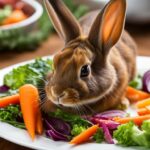Greetings fellow rabbit owners and enthusiasts! Today, I want to address a crucial question that often pops up in conversations about our furry friends – can bunnies eat avocado? As responsible rabbit caregivers, it is our duty to ensure that we provide a safe and healthy diet for our adorable companions. So, let’s dive into the topic of avocado toxicity in rabbits and understand why avocados are a big no-no for bunnies.
The health of our bunnies is of utmost importance, and their diet plays a crucial role in maintaining their well-being. While these little creatures have specific dietary needs, it’s essential to be aware of what foods can be harmful to them. Avocado tops the list of foods that should never be included in a rabbit’s diet.
Avocados contain a harmful compound called persin, which can wreak havoc on a rabbit’s gastrointestinal, cardiovascular, and respiratory systems. Ingesting even a small amount of avocado can lead to serious illness and, in some cases, even prove fatal for our beloved bunnies. That’s why it is essential to keep avocados far away from our furry friends to ensure their safety.
Key Takeaways:
- Avocado is toxic to rabbits due to the presence of persin, a harmful compound.
- Ingesting avocado can lead to severe health complications and even death in rabbits.
- Understanding the digestive system and dietary needs of rabbits is crucial for their well-being.
- A balanced and fiber-rich diet consisting of hay, fresh vegetables, and limited amounts of fruits is ideal for rabbits.
- Avoid feeding rabbits other foods that can disrupt their digestion or pose health risks.
Understanding the Rabbit Digestive System
The digestive system of rabbits is unique and specifically adapted to process high-fiber diets. As herbivores, rabbits derive their nutrition mainly from plant material, particularly hay and grass. Their digestive tract consists of different compartments, each playing a crucial role in breaking down and extracting nutrients from the fibrous diet.
The first part of the rabbit’s digestive system is the mouth, where food is initially ingested and chewed. Unlike humans, rabbits have continuously growing teeth, which require a constant supply of fibrous material to naturally wear them down. From the mouth, food then passes through the esophagus and into the stomach, where it is partially broken down before moving into the small intestine.
In the small intestine, the majority of nutrient absorption takes place. Here, fiber-rich food is broken down by enzymes and the essential nutrients are absorbed into the bloodstream. The remaining undigested fiber then moves into the large intestine, where specialized bacteria help to ferment and break it down further. This process produces vital nutrients called volatile fatty acids, which are a significant energy source for rabbits.
Overall, the rabbit’s digestive system is finely tuned to efficiently extract nutrients from a diet rich in fiber. It is essential for rabbit owners to provide a balanced and fiber-rich diet to support the optimal health and well-being of their furry companions.
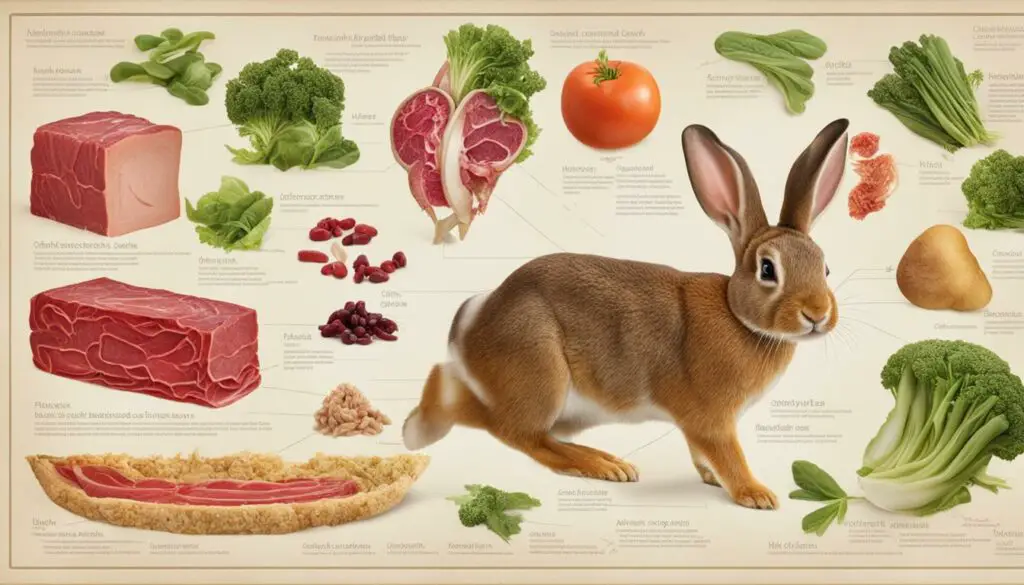
The Rabbit Digestive System: A Closer Look
To gain a deeper understanding of the rabbit’s digestive system, let’s explore the different compartments in more detail:
| Compartments | Function |
|---|---|
| Mouth | Food is ingested and chewed before being swallowed. |
| Stomach | Food is partially broken down by stomach acids and enzymes. |
| Small Intestine | The majority of nutrient absorption occurs here. |
| Large Intestine | Specialized bacteria ferment fiber and produce vital nutrients. |
Understanding the intricacies of the rabbit digestive system allows us to make informed decisions about their diet and nutrition. By providing a balanced and fiber-rich diet, we can ensure the optimal health and well-being of our beloved pet rabbits.
The Dangers of Avocado for Rabbits
Avocado is a delicious and nutritious fruit for humans, but it can be extremely toxic to rabbits. The main culprit is a natural compound called persin, which is present in all parts of the avocado, including the skin, flesh, seed, stems, and leaves. Persin can have detrimental effects on a rabbit’s gastrointestinal, cardiovascular, and respiratory systems, leading to severe illness or even death.
When a rabbit ingests persin, it can cause inflammation and damage to their digestive tract. This can result in symptoms such as diarrhea, vomiting, abdominal pain, and loss of appetite. Additionally, persin can also affect a rabbit’s cardiovascular system, leading to irregular heart rates and fluid abnormalities. Respiratory distress and difficulty breathing are also common signs of avocado poisoning in rabbits.
It’s important for rabbit owners to be vigilant and keep avocados out of their pets’ reach. Even a small amount of avocado can have a devastating impact on a rabbit’s health. If you suspect that your rabbit has ingested avocado, it is crucial to seek immediate veterinary assistance. Prompt medical attention can help minimize the potential damage and increase the chances of a successful recovery.
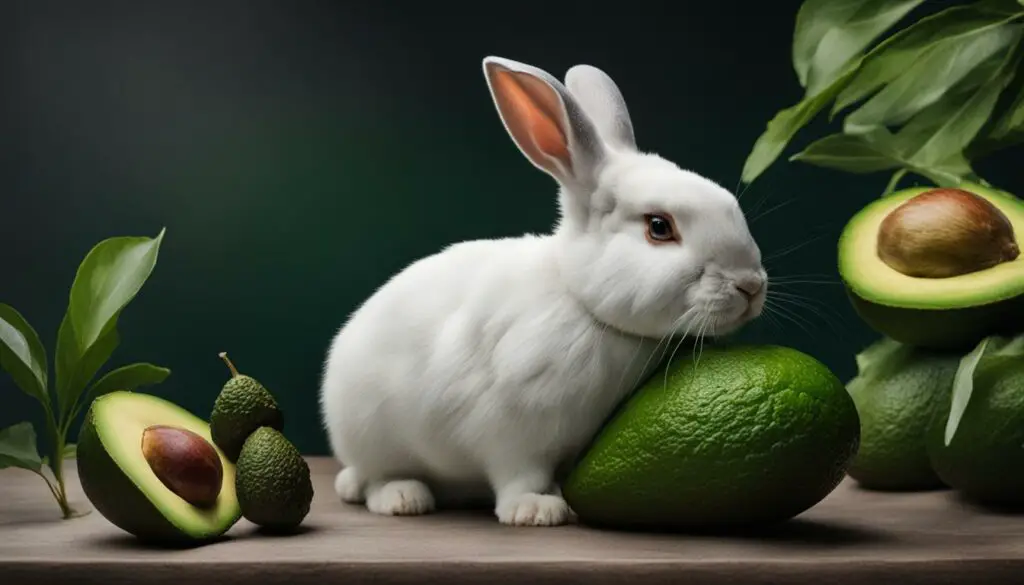
Symptoms of Avocado Poisoning in Rabbits:
- Inflammation of mammary glands in pregnant rabbits
- Difficulty breathing or respiratory distress
- Fluid abnormalities
- Irregular heart rates
- Overall weakness or limited movement
Remember, prevention is always better than treatment when it comes to avocado toxicity in rabbits. By ensuring that avocados are kept away from your furry friend and providing a safe and balanced diet, you can help protect their health and well-being.
Foods to Avoid Feeding Rabbits
While avocados are a well-known food to avoid giving to rabbits, there are other foods that should be kept away from these furry creatures. These foods can disrupt their digestion or pose other health risks, so it’s important to be aware of what not to feed your rabbit. Here is a list of foods that should be avoided:
- Yogurt drops
- Bread
- Pasta
- Cookies
- Crackers
- Iceberg lettuce
- Silverbeet
- Hamster food
- Walnuts
- Oatmeal
- Chocolate
- Peanut butter
- Potatoes
- Rhubarb
- Meat
- Cauliflower
These foods can cause digestive issues, lead to nutrient imbalances, or even be toxic to rabbits. It’s important to provide a balanced and appropriate diet for your furry friend to ensure their health and well-being. If you’re ever unsure about a specific food, it’s best to consult with a veterinarian before feeding it to your rabbit.
Why should you avoid feeding these foods to your rabbit?
The foods listed above can have various negative effects on a rabbit’s digestion and overall health. For example, bread, pasta, and cookies are high in carbohydrates that can be difficult for rabbits to digest, leading to gastrointestinal problems. Iceberg lettuce and silverbeet have a high water content and low nutritional value, which can cause diarrhea in rabbits. Chocolate is toxic to rabbits and can cause serious health issues. Potatoes and rhubarb contain toxins that are harmful to rabbits. These are just a few examples of why it’s important to avoid feeding these foods to your rabbit.
Providing a safe and nutritious diet for your rabbit
Ensuring that your rabbit gets a balanced and appropriate diet is crucial for their well-being. The main components of a rabbit’s diet should be high-quality hay, fresh vegetables, and limited amounts of fruits. Hay provides the necessary fiber for proper digestion, while vegetables and fruits offer added nutrients and variety. It’s important to research and understand which vegetables and fruits are safe for rabbits to consume, as some may be harmful in large quantities or if not properly prepared. Always consult with a veterinarian for guidance on the best diet for your rabbit.
| Foods to Avoid | Reasons to Avoid |
|---|---|
| Yogurt drops | High sugar content can lead to obesity and tooth decay |
| Bread | High in carbohydrates and low in nutrients, difficult to digest |
| Pasta | High in carbohydrates and low in nutrients, difficult to digest |
| Cookies | High in sugar, fat, and artificial ingredients |
| Crackers | High in salt and low in nutrients |
| Iceberg lettuce | High water content, low nutritional value, can cause diarrhea |
| Silverbeet | High water content, low nutritional value, can cause diarrhea |
| Hamster food | Not formulated for rabbits, can lead to nutritional imbalances |
| Walnuts | High in fat, can cause digestive issues |
| Oatmeal | High in carbohydrates, can cause digestive issues |
| Chocolate | Toxic to rabbits, can cause serious health issues |
| Peanut butter | High in calories and fat, can cause digestive issues |
| Potatoes | Contain toxins harmful to rabbits |
| Rhubarb | Contain toxins harmful to rabbits |
| Meat | Rabbits are herbivores and cannot properly digest meat |
| Cauliflower | Can cause gas and digestive discomfort in some rabbits |
The Importance of a Healthy Diet for Pet Rabbits
As a responsible rabbit owner, it’s crucial to understand the significance of providing a healthy diet for your furry friend. A balanced and nutritious diet plays a vital role in maintaining your rabbit’s overall health and well-being. By offering the right foods, you can ensure that your rabbit receives the essential nutrients it needs for optimal health.
A healthy rabbit diet should primarily consist of high-quality Timothy hay. Hay is rich in fiber, which is essential for proper digestion and maintaining healthy teeth. It also helps prevent common dental problems that rabbits may face. Hay is readily available and should be provided in unlimited quantities to mimic the natural grazing habits of wild rabbits.
In addition to hay, fresh vegetables are a crucial component of a rabbit’s diet. Vegetables such as leafy greens, carrots, and bell peppers provide essential vitamins and minerals that contribute to your rabbit’s overall health. Remember to introduce new vegetables gradually to avoid digestive upset and monitor your rabbit’s response to different types of veggies.
While fruits can be enjoyed by rabbits, they should be given in limited quantities due to their high sugar content. Fruits like apples, bananas, and berries can provide a tasty and nutritious occasional treat. However, too much fruit can lead to weight gain and other health issues, so moderation is key.
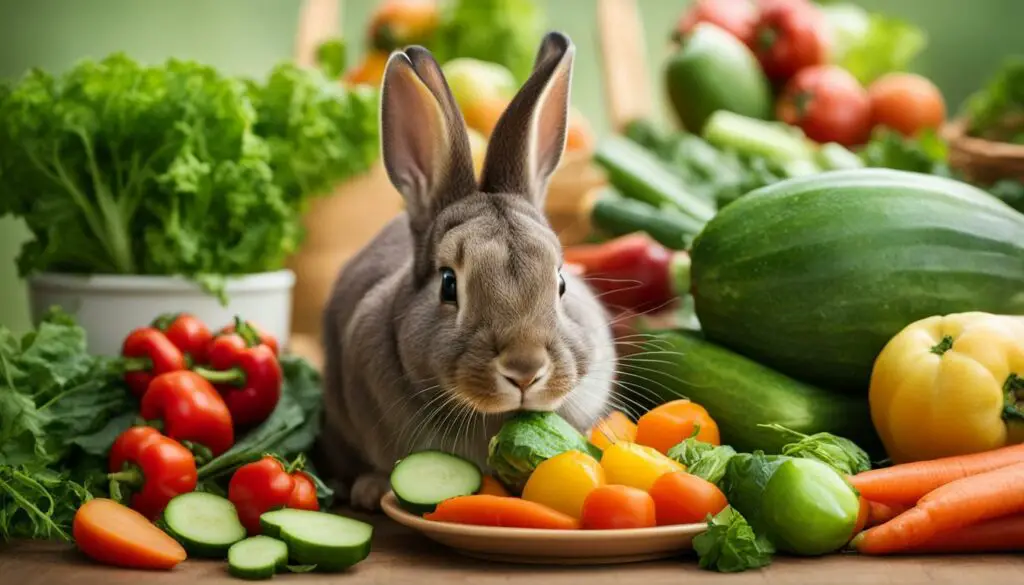
By providing a well-balanced and varied diet consisting of hay, vegetables, and limited amounts of fruit, you are ensuring that your pet rabbit receives the necessary nutrients for a long and healthy life. Remember to consult with your veterinarian to determine the specific dietary needs of your rabbit and make any necessary adjustments based on their age, weight, and overall health.
Safe Fruits for Rabbits to Enjoy
While avocados are off-limits for rabbits, there are several safe fruits that they can enjoy as occasional snacks. Not only are these fruits tasty, but they also provide essential vitamins and minerals to support your rabbit’s overall health. Here are some nutritious fruits that rabbits can safely indulge in:
- Apples: Slice an apple into small pieces and offer it as a sweet treat. Remove the seeds and core before feeding.
- Bananas: A small slice of banana can be a delicious and nutritious snack for your rabbit.
- Papayas: Rich in vitamin C, papayas can be a refreshing and healthy choice for your furry friend.
- Oranges: Peel an orange and offer small segments to your rabbit. They will love the juicy taste!
- Plums: Remove the pit and slice a plum into small pieces for your rabbit to enjoy.
- Pineapples: Cut up some fresh pineapple into bite-sized chunks for your rabbit to savor.
- Grapes: Grapes can be a tasty treat, but remember to remove seeds and cut them into small pieces to prevent choking hazards.
Remember, moderation is key when feeding fruits to your rabbit. Too much sugar can upset their delicate digestive system. It’s also important to introduce new fruits gradually and monitor your rabbit for any adverse reactions.
Quote: “My rabbit absolutely loves apples and bananas! I give her a small slice as a special treat, and she hops around with delight. It’s a healthy and enjoyable snack for her!” – Rabbit owner

Offering a variety of safe fruits in moderation can provide a welcome change to your rabbit’s diet. Remember to always prioritize a balanced and fiber-rich diet that includes hay, vegetables, and limited fruits. By providing a safe and nutritious diet, you can ensure the well-being and happiness of your furry companion.
Rabbit-Safe Vegetables for a Balanced Diet
When it comes to providing a balanced diet for your pet rabbit, incorporating a variety of rabbit-safe vegetables is essential. These vegetables not only offer essential nutrients but also help to add variety to your rabbit’s meals. Here are some safe vegetables that you can include in your rabbit’s diet:
- Bok choy
- Carrot tops
- Radish tops
- Fennel
- Bell peppers
- Zucchini
- Endive
- Cucumber
- Collard greens
- Broccoli stems and leaves
- Dandelion greens
- Green and red leaf lettuce
These vegetables offer a range of nutrients and help to promote optimal health and wellbeing in rabbits. By including these vegetables in your rabbit’s diet, you can provide essential vitamins, minerals, and fiber that support their overall health.
Adding Variety to Your Rabbit’s Diet
When feeding your rabbit vegetables, it’s important to introduce new options gradually to prevent digestive upset. Start by offering small amounts of a new vegetable and monitor your rabbit’s response. If there are no signs of digestive issues, you can gradually increase the amount over time.
Remember that each rabbit is unique, and preferences can vary. If your rabbit shows a dislike for a particular vegetable, try offering different options to find what they enjoy. And always ensure that the vegetables you offer are fresh and free from pesticides.
By incorporating a variety of safe vegetables into your rabbit’s diet, you can provide them with a nutritionally balanced and interesting meal plan. Remember to always consult with a veterinarian for specific dietary recommendations based on your individual rabbit’s needs.
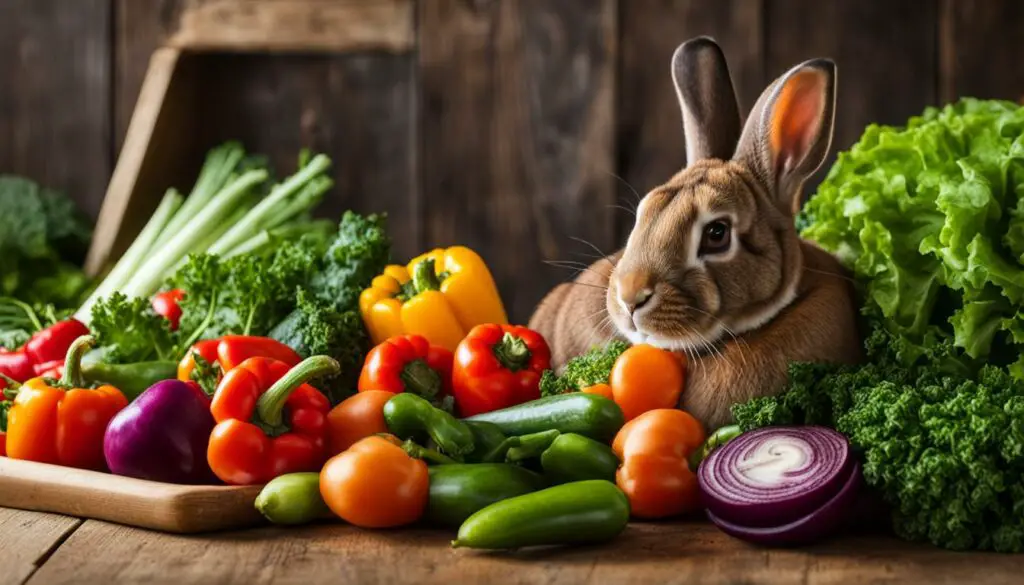
Signs of Avocado Poisoning in Rabbits
Avocado poisoning can have serious consequences for rabbits, affecting various systems in their bodies. It is important for rabbit owners to be aware of the signs and symptoms of avocado toxicity in order to seek immediate veterinary attention. Here are some common signs to watch out for:
- Inflammation of Mammary Glands in Pregnant Rabbits: Avocado poisoning can lead to inflammation in the mammary glands of pregnant rabbits. This can be observed as redness, swelling, or discharge from the nipples.
- Difficulty Breathing or Respiratory Distress: Rabbits that have ingested avocado may experience difficulty breathing or show signs of respiratory distress. This can manifest as rapid or labored breathing, wheezing, or coughing.
- Fluid Abnormalities: Avocado toxicity can disrupt the fluid balance in a rabbit’s body. This can result in excessive thirst, increased urination, or changes in the consistency of urine or feces.
- Irregular Heart Rates: The ingestion of avocado can affect a rabbit’s cardiovascular system, leading to irregular heart rates. This can be observed as a rapid or irregular heartbeat.
- Weakness or Limited Movement: Rabbits that have been poisoned by avocado may exhibit overall weakness or have difficulty moving. They may appear lethargic, have reduced appetite, or be reluctant to engage in physical activity.
If your rabbit shows any of these symptoms after ingesting avocado, it is crucial to seek immediate veterinary assistance. Avocado poisoning can progress quickly and can be life-threatening if left untreated. A veterinarian will be able to provide the necessary care and treatment to help your rabbit recover.
| Signs of Avocado Poisoning in Rabbits | Treatment |
|---|---|
| Inflammation of Mammary Glands in Pregnant Rabbits | Veterinary examination and treatment |
| Difficulty Breathing or Respiratory Distress | Oxygen therapy, medication to relieve respiratory symptoms |
| Fluid Abnormalities | Fluid therapy to restore hydration and electrolyte balance |
| Irregular Heart Rates | Cardiovascular monitoring, medication to regulate heart rate |
| Weakness or Limited Movement | Supportive care, medication to improve overall health and mobility |
It is important to remember that prevention is the best approach when it comes to avocado toxicity in rabbits. Ensure that avocados are kept out of reach of your rabbit and never feed them any part of the fruit. By being vigilant and providing a safe, rabbit-friendly diet, you can help protect your furry friend from the dangers of avocado poisoning.
What to Do If Your Rabbit Eats Avocado
If you suspect that your rabbit has eaten avocado, it is important to take immediate action to ensure their health and well-being. Avocado can be toxic to rabbits and can lead to serious complications if ingested. Here are the steps you should follow if your rabbit eats avocado:
- Seek Veterinary Help: Contact your veterinarian right away and inform them about the avocado ingestion. They will be able to guide you on the next steps and provide appropriate treatment.
- Observe for Symptoms: Keep a close eye on your rabbit for any signs of avocado poisoning. These symptoms may include difficulty breathing, irregular heart rates, inflammation of mammary glands (in pregnant rabbits), and overall weakness or limited movement. If you notice any of these symptoms, it is important to notify your veterinarian immediately.
- Follow Veterinarian’s Guidance: Your veterinarian will provide specific instructions on how to proceed. They may advise inducing vomiting, if it is safe for your rabbit, or they may recommend other treatments to counteract the effects of avocado toxicity.
- Monitor Your Rabbit: After receiving treatment, closely monitor your rabbit’s condition. Ensure they have access to fresh water and a safe, calm environment to rest and recover. If you notice any further changes in their behavior or health, contact your veterinarian for further guidance.
Remember, time is of the essence when it comes to avocado poisoning in rabbits. Prompt veterinary intervention is crucial to ensure the best possible outcome for your rabbit’s health. By acting quickly and following your veterinarian’s advice, you can help mitigate the potential harm caused by avocado ingestion.
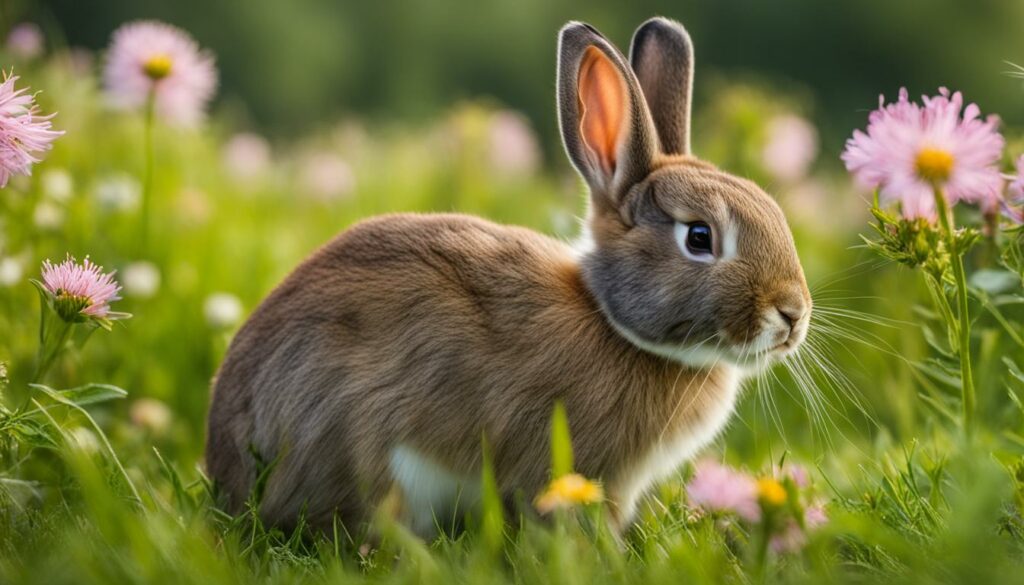
It’s important to note that prevention is always better than cure. Avoiding avocado altogether is the safest approach to protecting your rabbit from potential harm. Stick to a well-balanced diet consisting of high-quality hay, fresh vegetables, and limited amounts of rabbit-safe fruits. By providing a safe and nutritious diet, you can keep your furry friend happy and healthy.
The Importance of a Balanced Rabbit Diet
Providing a balanced diet for your pet rabbit is vital for their overall health and well-being. A proper rabbit diet should consist of high-quality hay, fresh vegetables, and limited amounts of fruits. This combination provides the necessary fiber, vitamins, and minerals that rabbits need to thrive.
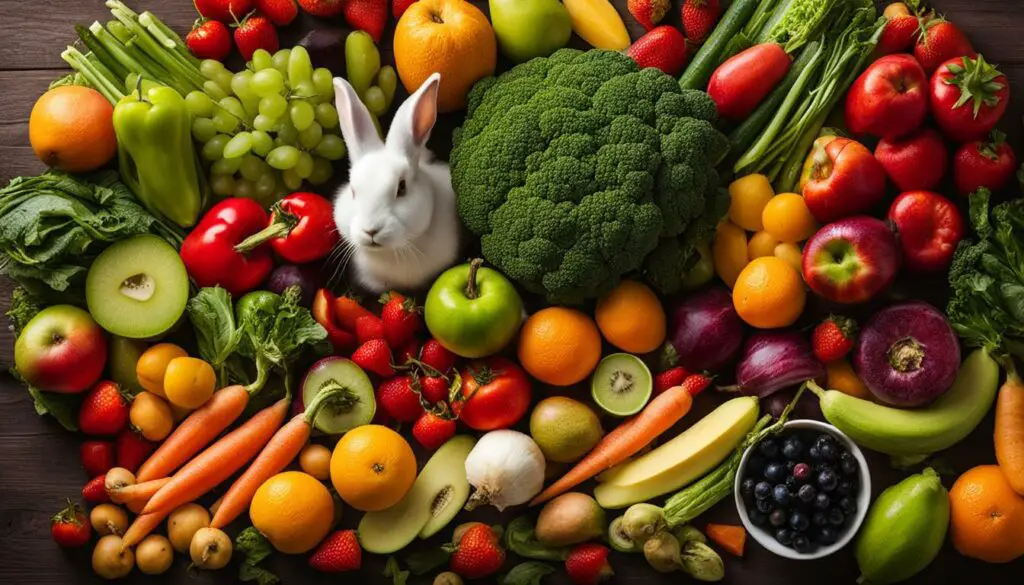
High-Quality Hay
High-quality hay, such as Timothy hay, should make up the bulk of your rabbit’s diet. Hay is essential for maintaining proper digestion and wearing down their teeth, which continuously grow. It also provides the necessary fiber that rabbits need to keep their gut healthy and prevent issues like gastrointestinal stasis. Always ensure that the hay is fresh, free from mold or dust, and readily available for your rabbit to munch on throughout the day.
Fresh Vegetables
Include a variety of fresh vegetables in your rabbit’s diet to provide them with essential nutrients and added hydration. Safe vegetables for rabbits include bok choy, carrot tops, bell peppers, zucchini, kale, and cilantro. These vegetables should be introduced gradually to allow your rabbit’s digestive system to adjust. Offer a mix of leafy greens and colorful vegetables to provide a range of vitamins and minerals.
Limited Amounts of Fruits
Fruits should be given in moderation as treats due to their higher sugar content. Safe fruits for rabbits include apples, bananas, strawberries, and blueberries. These fruits can add variety to your rabbit’s diet and provide additional vitamins. Remember to remove any seeds or pits before offering fruits to your rabbit, as they can be choking hazards.
A balanced rabbit diet promotes proper digestion, maintains a healthy weight, and supports overall rabbit health. It is important to avoid feeding rabbits foods that can disrupt their digestion or pose other health risks. By providing a well-rounded diet, you can ensure that your furry friend lives a happy and healthy life.
Alternatives to Avocado for Rabbit Treats
Rabbits love treats, and while avocados are off-limits, there are plenty of safe and healthy alternatives that you can offer your furry friend. These tasty treats not only provide a delicious snack but also offer nutritional benefits for your rabbit’s well-being. Here are some safe alternatives to avocado for rabbit treats:
Fruits:
Just like humans, rabbits have a sweet tooth and enjoy the occasional fruity indulgence. Fruits like mangoes, pineapples, apples, and bananas make great alternatives to avocado. They are rich in vitamins and minerals and can be given in small quantities as a special treat. Remember to remove any seeds or pits and cut the fruit into bite-sized pieces for your rabbit to enjoy.
Vegetables:
Vegetables are an essential part of a rabbit’s diet, and they can also be used as treats. Safe vegetable options include cucumber, bell peppers, radish tops, and zucchini. These vegetables provide additional nutrients and fiber to support your rabbit’s overall health. However, make sure to introduce new vegetables gradually and in moderation to avoid digestive issues.
Herbs:
Rabbits have a natural affinity for herbs, and these can be a great addition to their treat repertoire. Safe herb options include parsley, cilantro, dill, and mint. Not only do these herbs provide a burst of flavor, but they also offer beneficial nutrients. Ensure that the herbs are fresh and thoroughly washed before offering them to your rabbit.
| Treat | Description | Benefits |
|---|---|---|
| Fresh Apple Slices | Slices of fresh apple without seeds. | High in fiber and vitamin C. |
| Banana Pieces | Small pieces of ripe banana. | Rich in potassium and vitamin B6. |
| Mango Chunks | Bite-sized chunks of fresh mango. | Provides vitamins A, C, and E. |
| Parsley Sprigs | Fresh sprigs of parsley. | Rich in antioxidants and vitamin K. |
“Offering safe and nutritious treats to your rabbit is a great way to bond and provide enrichment. Just remember to feed these treats in moderation and alongside a balanced diet to maintain your rabbit’s overall health”
Remember, while these alternatives are safe for rabbits, moderation is key. Treats should only make up a small portion of your rabbit’s diet, with a focus on a balanced and fiber-rich meal plan. Always consult with your veterinarian to ensure that the treats you offer are suitable for your specific rabbit’s dietary needs. By providing safe and healthy alternatives, you can indulge your rabbit’s taste buds while promoting their well-being.
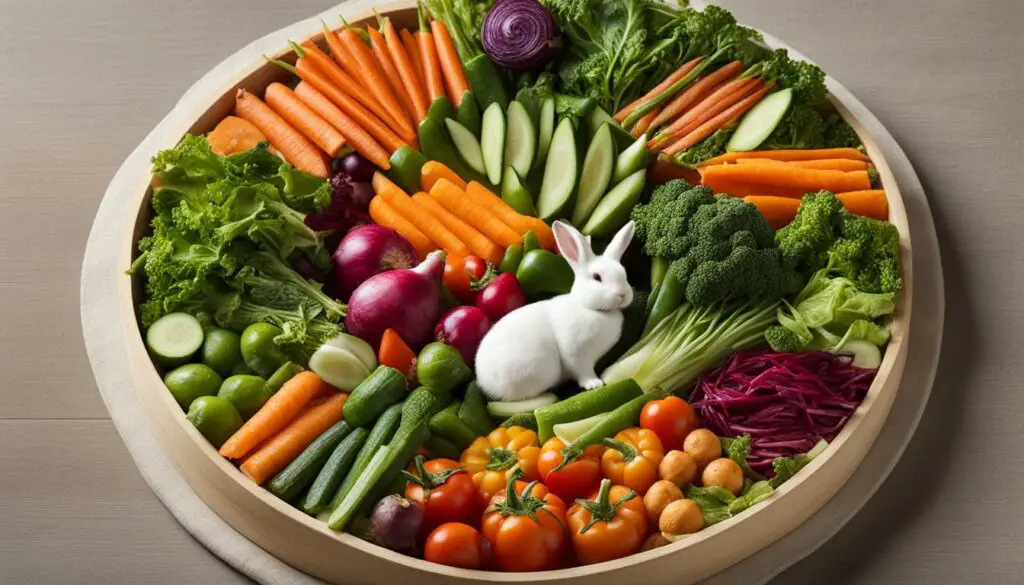
Avocado Awareness for Rabbit Owners
As a responsible rabbit owner, it is crucial to be aware of the potential dangers that certain foods can pose to your furry friend. Avocado, in particular, can be toxic to rabbits and should never be included in their diet. Educating yourself about avocado toxicity and the importance of a safe rabbit diet is essential for the well-being of your beloved pet.
Avocado contains a compound called persin, which is harmful to rabbits. It can negatively affect their gastrointestinal, cardiovascular, and respiratory systems, leading to serious illness or even death. It is vital to keep all parts of the avocado, including the skin, flesh, seed, stems, and leaves, away from your rabbit to ensure their safety.
Creating awareness about the dangers of avocados among rabbit owners is crucial. Many people may not be aware of the potential harm that avocados can cause to their pets. By spreading accurate information and encouraging safe rabbit diets, we can help protect our furry friends from unnecessary harm and ensure their long and healthy lives.
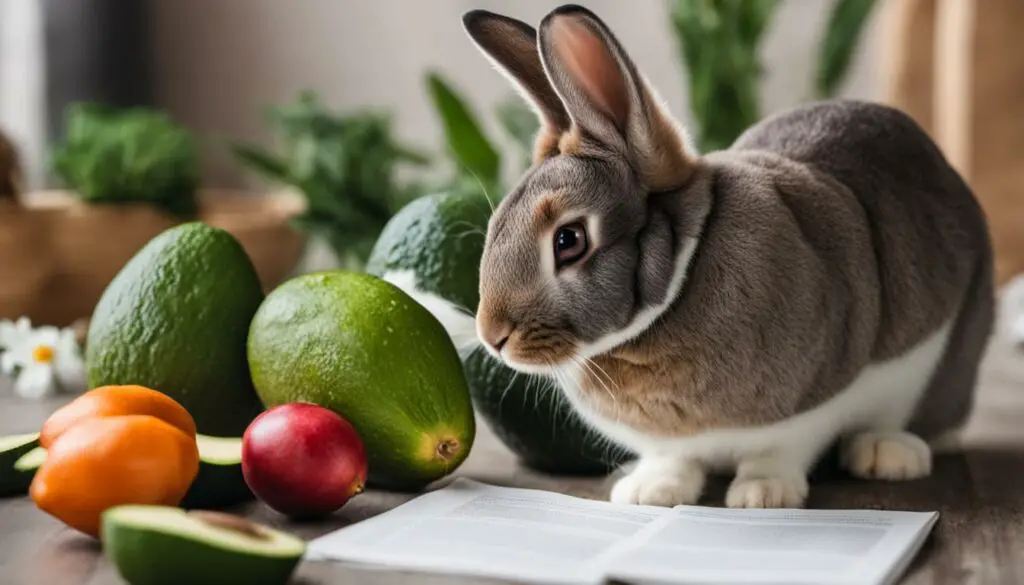
Safe Alternatives for Rabbit Treats
While avocados should be avoided, there are numerous safe alternatives that rabbits can enjoy as occasional treats. Fruits like mangoes, pineapples, apples, and bananas can provide a tasty and nutritious snack for your rabbit. It’s important to remember that these treats should be given in moderation to maintain a balanced diet for your furry friend.
Proper Rabbit Care and Nutrition
Providing proper care and nutrition is essential for maintaining the health and well-being of rabbits. As a responsible rabbit owner, it is important to understand the specific needs of these furry companions and ensure that their diet and living conditions meet those requirements.
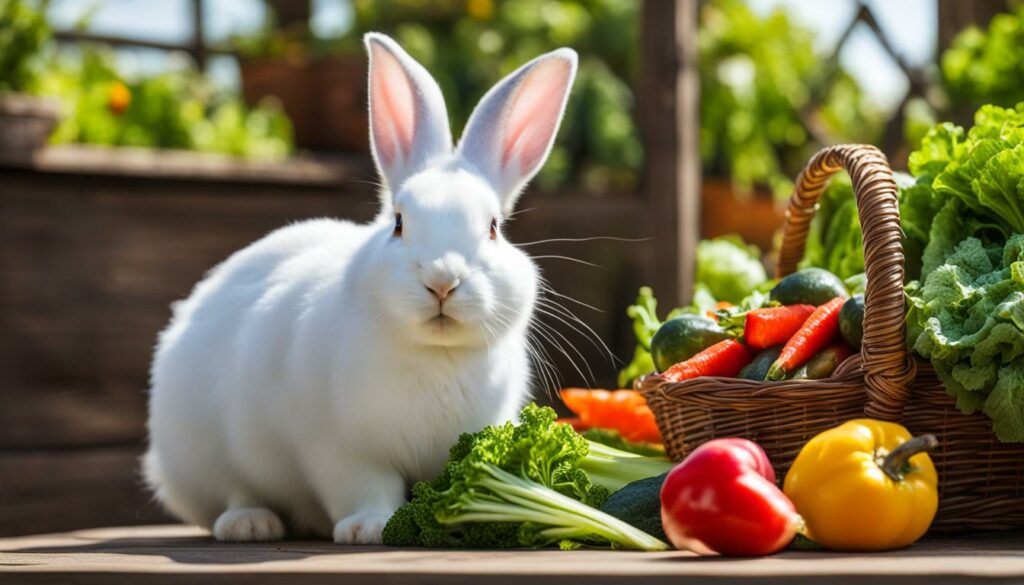
Rabbits thrive on a diet that consists mainly of high-quality hay, fresh vegetables, and limited amounts of fruits. Hay should be the primary component of their diet as it provides the necessary fiber for their digestion and helps wear down their teeth, which continuously grow. Fresh vegetables, such as bok choy, carrot tops, and bell peppers, should be offered daily to provide additional nutrients and variety. Fruits, like apples and bananas, can be given as occasional treats due to their higher sugar content.
Aside from diet, rabbits also require a clean living environment that is spacious and safe. They should have access to fresh water at all times and be provided with toys and hiding places to keep them mentally stimulated. Regular exercise is important to prevent obesity and ensure the proper functioning of their digestive system. Additionally, social interaction and bonding with their human caretakers contribute to their overall well-being.
The Key Aspects of Proper Rabbit Care and Nutrition:
- Feeding a balanced diet consisting of high-quality hay, fresh vegetables, and limited amounts of fruits.
- Providing a clean living environment with ample space for exercise and exploration.
- Offering fresh water at all times and ensuring access to toys and hiding places for mental stimulation.
- Engaging in regular exercise and providing opportunities for social interaction and bonding.
- Scheduling regular veterinary check-ups to monitor overall health and address any potential concerns.
By prioritizing the care and nutrition of our pet rabbits, we can ensure that they lead happy and healthy lives. Remember, each rabbit is unique, so it is important to monitor their specific dietary and behavioral needs and make adjustments accordingly. With proper care and nutrition, our furry friends can thrive and bring joy to our lives.
The Impact of Avocado Toxicity on Rabbit Health
Avocado toxicity can have serious consequences for a rabbit’s health. The compound persin found in avocados can affect the gastrointestinal, cardiovascular, and respiratory systems of rabbits, leading to illness and even death if ingested. It is crucial for rabbit owners to be aware of the health risks associated with feeding avocados to their furry friends.
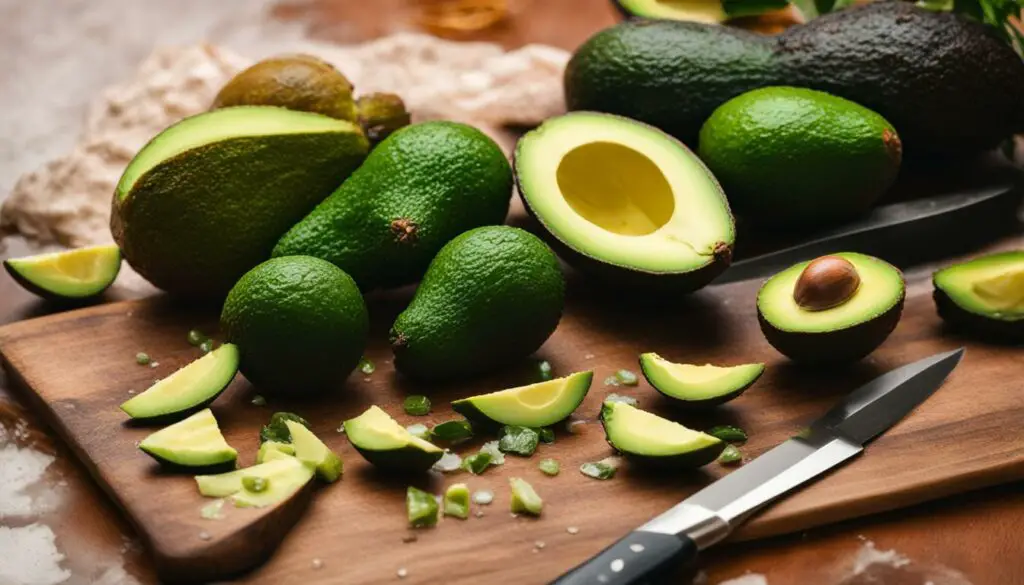
Rabbits have a unique digestive system that is highly sensitive and requires a balanced and fiber-rich diet. Avocados disrupt their digestion and can cause gastrointestinal issues, such as diarrhea and bloating. Additionally, the cardiovascular system of rabbits can be affected by avocado toxicity, leading to irregular heart rates and fluid abnormalities. Respiratory distress and overall weakness or limited movement are also common symptoms of avocado poisoning in rabbits.
It is important to prioritize the health and well-being of rabbits by avoiding foods that can harm them, such as avocados. By providing a safe and nutritious diet consisting of high-quality hay, fresh vegetables, and limited amounts of fruits, rabbit owners can ensure the optimal health of their furry companions. Consulting with a veterinarian on suitable dietary choices is essential for maintaining the overall well-being of pet rabbits.
Providing a Safe and Nutritious Diet for Your Pet Rabbit
When it comes to the diet of your pet rabbit, it’s important to prioritize their health and well-being. By understanding their specific dietary needs and providing safe foods, you can ensure that your furry friend receives a nutritious and well-balanced diet.
A healthy rabbit diet should consist primarily of high-quality hay, which is essential for their digestive system and provides the necessary fiber intake. Fresh vegetables should also be included in their diet, as they provide important vitamins and minerals. However, it’s important to introduce new vegetables slowly and in small quantities to avoid digestive upset.
In addition to hay and vegetables, you can occasionally offer your rabbit small portions of fruits as a treat. Fruits such as apples, bananas, and grapes can provide additional nutrients and variety in their diet. Remember to remove any seeds or pits from the fruits before offering them to your rabbit.
It’s crucial to avoid feeding your rabbit foods that can be harmful to their health. Some foods, such as avocados, can be toxic to rabbits and should never be given to them. Additionally, foods high in sugar, salt, or fat should be avoided, as they can lead to health issues such as obesity or dental problems.
Table: Safe Foods for Your Rabbit
| Hay | Vegetables | Fruits (Occasional Treats) |
|---|---|---|
| Timothy Hay | Bok Choy | Apples |
| Orchard Grass Hay | Carrot Tops | Bananas |
| Oat Hay | Romaine Lettuce | Grapes |
| Alfalfa Hay (for young rabbits and pregnant or nursing rabbits) | Kale | Pineapple |
Remember to always provide clean and fresh water for your rabbit. Water should be changed daily to ensure their hydration. Additionally, it’s important to provide a clean living environment, regular exercise, and social interaction for your rabbit’s overall well-being.
By following these guidelines and providing a safe and nutritious diet for your pet rabbit, you can ensure that they live a happy and healthy life.
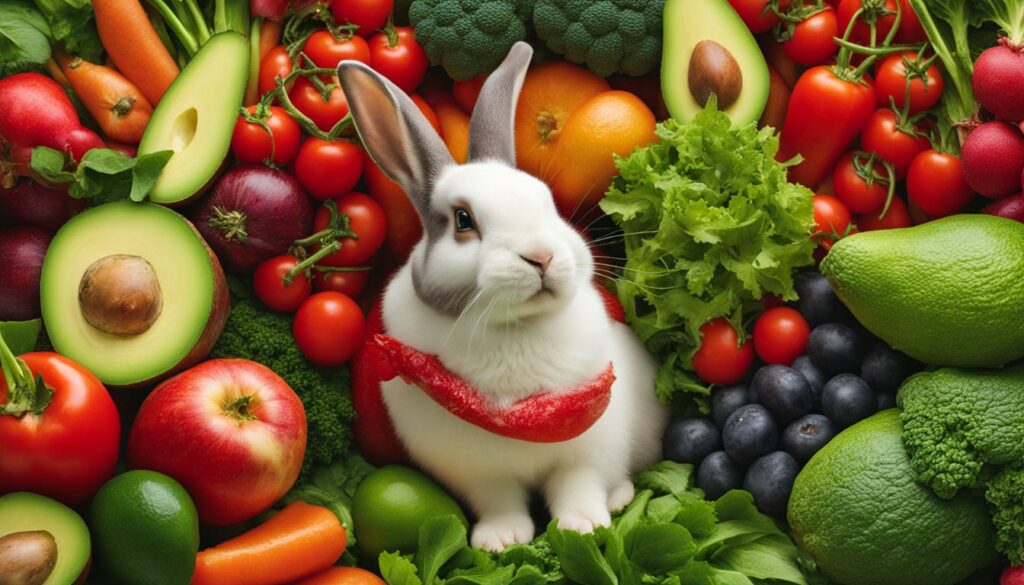
Conclusion
In summary, it is crucial to prioritize a safe and nutritious diet for your pet rabbit. Avocados should never be included in their diet, as they can be toxic and harmful to their health. Instead, focus on providing a balanced and fiber-rich diet that consists mainly of high-quality hay, fresh vegetables, and limited amounts of fruits.
By understanding the specific dietary needs of rabbits and avoiding foods that can disrupt their digestion or pose other health risks, you can ensure the well-being of your furry companion. Remember to offer a variety of safe fruits and vegetables as occasional treats, following moderation guidelines.
Alongside a proper diet, proper care and nutrition for rabbits include providing a clean living environment, fresh water, regular exercise, and social interaction. Regular veterinary check-ups and monitoring for any signs of illness or discomfort are also essential for maintaining the overall health and well-being of your pet rabbit.
By following these guidelines and prioritizing the health of your rabbit, you can enjoy a happy and thriving relationship with your furry friend. Remember, a safe diet and proper nutrition play a crucial role in ensuring the longevity and well-being of your beloved pet.
FAQ
Can rabbits eat avocados?
No, avocados are toxic to rabbits and should never be included in their diet. Avocado contains a compound called persin, which can be deadly if ingested by rabbits.
What other foods should be avoided when feeding rabbits?
In addition to avocados, rabbits should avoid foods like yogurt drops, bread, pasta, cookies, crackers, iceberg lettuce, silverbeet, hamster food, walnuts, oatmeal, chocolate, peanut butter, potatoes, rhubarb, meat, and cauliflower. These foods can disrupt a rabbit’s digestion or pose other health risks.
What should a healthy diet for pet rabbits consist of?
A healthy diet for pet rabbits should primarily consist of high-quality Timothy hay, along with fresh vegetables and limited amounts of fruits. This diet provides the necessary fiber, vitamins, and minerals that rabbits need to thrive.
Can rabbits eat any fruits?
Yes, rabbits can enjoy fruits as occasional treats. Safe fruits for rabbits include apples, bananas, papayas, oranges, plums, pineapples, and grapes. These fruits provide essential vitamins and minerals and can add variety to a rabbit’s diet when fed in moderation.
What are some safe vegetables for rabbits?
Safe vegetables for rabbits include bok choy, carrot tops, radish tops, fennel, bell peppers, zucchini, endive, cucumber, collard greens, broccoli stems and leaves, dandelion greens, and green and red leaf lettuce. These vegetables provide additional nutrients and fiber to support a well-rounded diet.
What are the symptoms of avocado poisoning in rabbits?
Symptoms of avocado poisoning in rabbits may include inflammation of mammary glands in pregnant rabbits, difficulty breathing or respiratory distress, fluid abnormalities, irregular heart rates, and overall weakness or limited movement. Immediate veterinary attention should be sought if these symptoms occur.
What should I do if my rabbit eats avocado?
If your rabbit accidentally consumes avocado, it is important to seek immediate veterinary help. Report the ingestion of avocado and follow the veterinarian’s guidance for treatment. Do not delay in seeking professional assistance as avocado poisoning can have serious consequences for a rabbit’s health.
Why is a balanced diet important for rabbits?
A balanced diet is crucial for a rabbit’s overall health. The main component of their diet should be high-quality hay, along with fresh vegetables and limited amounts of fruits. This combination provides the necessary fiber, vitamins, and minerals that rabbits need to thrive.
Are there any safe alternatives to avocados for rabbit treats?
Yes, there are many safe alternatives to avocados that rabbits can enjoy as occasional treats. Mangoes, pineapples, apples, bananas, and other rabbit-safe fruits provide a tasty and nutritious snack for rabbits when given in moderation.
Why is it important to educate rabbit owners about avocado toxicity?
Many people may not be aware of the toxicity of avocados or the potential harm it can cause to rabbits. By spreading awareness and providing accurate information, rabbit owners can make informed decisions about their pets’ diet and ensure their well-being.
What is the importance of proper care and nutrition for rabbits?
Proper care and nutrition for rabbits include providing fresh water, a clean living environment, regular exercise, and social interaction. Regular veterinary check-ups and monitoring for any signs of illness or discomfort are also essential for ensuring the overall health and well-being of pet rabbits.
What are the potential health risks of avocado toxicity in rabbits?
Avocado toxicity can have serious consequences for a rabbit’s health. It can affect their cardiovascular and respiratory systems, leading to potentially life-threatening complications. It is important to prioritize the health and well-being of rabbits by avoiding foods that can harm them, such as avocados.
How can I provide a safe and nutritious diet for my pet rabbit?
By understanding the specific dietary needs of rabbits and avoiding foods that can be harmful to them, pet owners can provide a safe and nutritious diet for their furry friends. A balanced diet consisting of high-quality hay, fresh vegetables, and limited amounts of fruits will support optimal health and well-being for pet rabbits.







